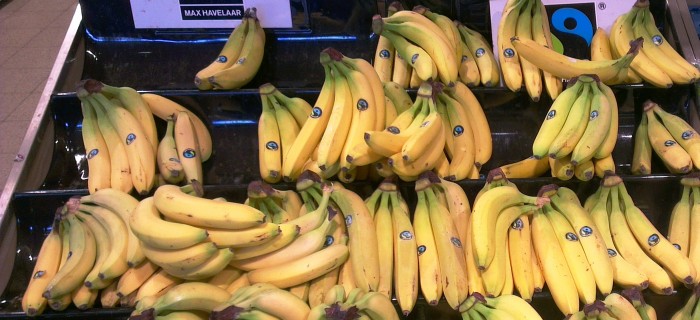Report from United Students for Fair Trade Meeting
United Students for Fair Trade, a national network of more than 100 student activist groups, held its fourth annual convergence this month in Boston. More than 350 people came together to discuss and strategize for the future of the Fair Trade movement. Students were joined by farmers from Uganda, Kenya, Ghana, Nicaragua, Peru, Ecuador, and Thailand; as well as allies who work in fair trade companies, nonprofits, and academia.
The conference focused on deepening and strengthening the fair trade movement. There were criticisms of the existing system of certifying and marketing fair trade products, discussions of how to connect the movement in the United States to farmer’s movements and other struggles for global justice, and a dedication to addressing privilege, power, and oppression.
The third day of the conference opened with a panel discussion taking a critical look at the future of fair trade. One of the criticisms the farmers brought up was that the minimum price for fair trade coffee has not changed significantly since 1988, while the costs of production and cost of living has gone up. Willington, a coffee cooperative leader from Uganda, said, “It does not take many calculations to figure out that [the fair trade price] is not fair.” Raul del Águila, a leader of the Central American Fair Trade Farmer’s association (CLAC), informed the conference that the Fairtrade Labeling Organization (FLO), which sets the international standards and prices for fair trade, had rejected his organization’s request for an increase in prices, but they would be meeting soon to reconsider. “I want to believe that their final decision has not been made… The information and justification [for a price increase] exists, and we ask for your help in insisting that the prices go up.” The need for student activists to work more closely with farmer organizations and movements in the global south resonated strongly at the conference.
One of the reoccurring themes was that Fair Trade is about much more than a price or a label. From the opening ceremony, when coffee farmer J.J. Keki warmly invited everyone to his village in Uganda, to the closing ceremony, when students from Mexico passionately urged students from the United States to spend time with farmers, human connections were emphasized as the heart of the Fair Trade movement. “One of the things that’s in it for us [in the global north] is the ability to get a little more in touch with our humanity,” said Jonathan Rosenthal, a founder of Equal Exchange, the first fair trade coffee company in the country. “The end goal should be a connected consciousness- a trade for humanity.”
One of the emerging models for fair trade presented at the convergence was that of farmer- owned brands and companies. Oké bananas, following in the footsteps of AgroFair in Europe, is partially owned by El Guabo producer cooperative in Ecuador. Similarly, Divine Chocolate, launched this Valentines Day in the United States, is owned by a farmer’s cooperative in Ghana. Farmers from both cooperatives came to the conference, and shared their enthusiasm for this model that returns more of the value of consumer products to the producers, and gives farmers a greater say in how wealth is distributed across the commodity chain.
Students articulated their criticism of the dominant trade system, in which poor people, usually with dark skin, produce goods for rich, predominantly white people. It became clear that they want fair trade not to just pay a premium, but to address the discrepancies in power so deeply rooted in the system. The weekend featured a group-wide session and several workshops and discussions on addressing privilege and racism, and the topic became the main focus of the closing ceremony. This deep reflection on race, inequality, and oppression often stays below the surface in activist movements, but by creating space for these difficult discussions, USFT is working to make this movement much stronger.
The USFT convergence provided a chance to step back, and see that all the fair trade labeling, although it is growing explosively, only begins to scratch the surface of a much greater struggle.
Stay in the loop with Food First!
Get our independent analysis, research, and other publications you care about to your inbox for free!
Sign up today!The dedicated student activists that organize the convergence have succeeded in creating a space for open dialogue and critical reflection of the core issues of fair trade. Dialogue and debate at the USFT convergence—and the campaigns that emerge—will be crucial to defining the fair trade movement. “How can we use trade as a vehicle for social change?” asked Ugandan coop leader Willington, “We will have to understand each other better.” The committed and critical activism represented at USFT holds great hope for guiding the movement.


 Help Food First to continue growing an informed, transformative, and flourishing food movement.
Help Food First to continue growing an informed, transformative, and flourishing food movement.




